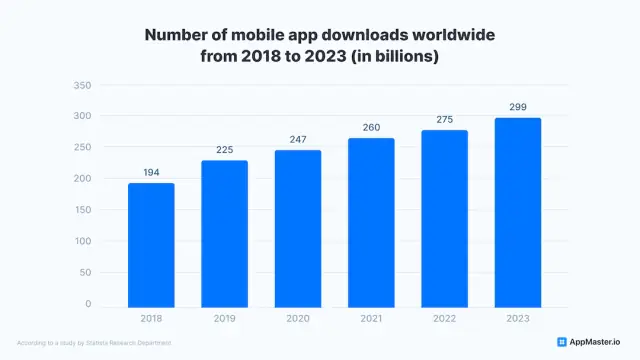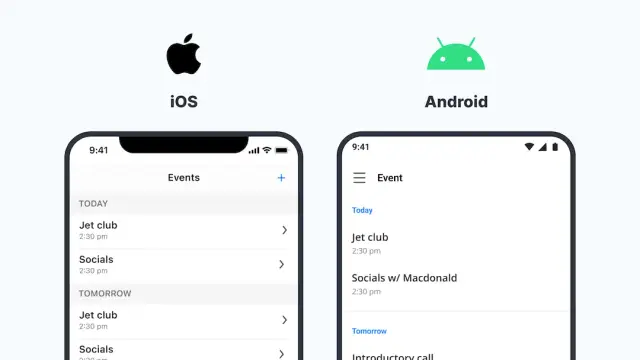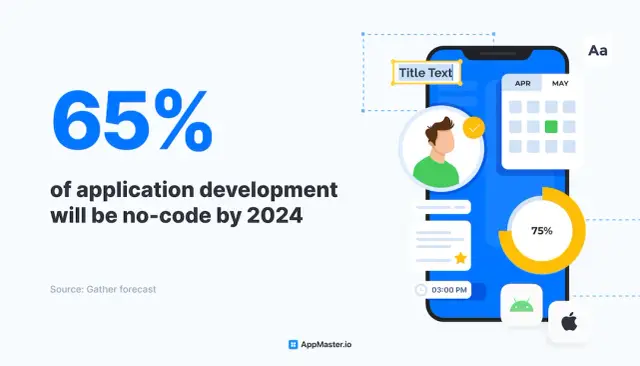How to Become a Mobile App Developer
Learn to become a mobile app developer with this step-by-step guide! Discover top tools, languages, and skills for iOS & Android success.

Mobile applications have become an integral part of our daily lives, driving the demand for skilled developers in this field. This comprehensive guide is designed to help aspiring developers embark on a fulfilling career path in mobile app development. We will delve into the essentials of the industry, exploring core programming languages, frameworks, and best practices. By the end of this guide, you will possess the knowledge and tools necessary to build engaging, user-friendly mobile applications that stand out in today's competitive market. So, let's begin our journey into mobile app development and transform your passion into a rewarding profession.

What is a mobile developer?
A mobile developer is a highly specialized software engineer who focuses on designing, building, and maintaining applications for mobile platforms such as iOS and Android. These professionals possess a deep understanding of mobile-centric programming languages, frameworks, and development tools, allowing them to create seamless, user-centric experiences tailored to mobile devices' unique constraints and opportunities. Their expertise extends beyond mere technical skills; mobile developers must also possess a keen sense of design, usability and problem-solving aptitude. As mobile technology continues to evolve rapidly, mobile developers must stay abreast of emerging trends, ensuring they can adapt their skills to address new challenges and leverage the latest advancements to create innovative, engaging applications that resonate with users across the globe.
What does a mobile developer do?
A mobile developer is responsible for a diverse range of tasks throughout the lifecycle of a mobile application. Their primary responsibilities include:
- Conceptualization: Collaborating with stakeholders, designers, and product managers to define the scope, functionality, and overall vision of the mobile application, ensuring it aligns with user needs and business objectives.
- Design and planning: Creating wireframes, mockups, and prototypes ( MVP) to outline the app's structure, user interface, and user experience while also selecting appropriate technologies, frameworks, and tools for development.
- Coding and implementation: Writing clean, efficient, well-documented code using mobile-specific programming languages (such as Swift for iOS and Kotlin for Android) and leveraging relevant libraries and frameworks to build the application's core features and functionality.
- Integration: Connecting the mobile app with relevant backend systems, APIs, and third-party services to facilitate data exchange and support a range of features, such as user authentication, data synchronization, and push notifications.
- Testing and debugging: Rigorously testing the application to identify and resolve any functional, performance, or compatibility issues across different devices, operating systems, and network conditions.
- Deployment: Preparing the application for submission to app stores, ensuring compliance with platform-specific guidelines, and managing the release process, including versioning, updates, and post-launch support.
- Maintenance and updates: Continuously monitor the app's performance, addressing user feedback and iterating on the product to refine features, resolve bugs, and implement enhancements to improve the user experience.
- Collaboration: Effectively working with cross-functional teams, including designers, QA engineers, project managers, and marketing teams, to ensure smooth execution of the project and alignment with broader organizational goals.
How to become a mobile developer
Embarking on a career as a mobile developer requires a combination of education, practical experience, and passion for technology. Here are some steps to help you get started on this exciting journey:
Attend a coding bootcamp
Coding bootcamps serve as immersive, concentrated educational programs designed to provide a rapid entry point into the dynamic realm of mobile app development. These intense, short-term training courses are specifically tailored to concentrate on a particular platform, such as iOS or Android, ensuring that participants thoroughly understand the appropriate programming languages, tools, and industry best practices.
In addition to offering a highly focused curriculum, coding bootcamps often provide valuable job placement support, assisting graduates in their quest to secure rewarding positions within the mobile development sector. By attending a coding bootcamp, aspiring developers can quickly build a solid foundation in their chosen platform, paving the way for a successful career in this highly sought-after field.
Learn the basics of programming
Prior to immersing yourself in the specialized domain of mobile app development, it is crucial to establish understanding of core programming principles. Developing expertise in fundamental concepts, such as data structures, algorithms, and object-oriented programming, will provide you with a solid basis for building your mobile development skills.
First, invest time learning widely-used programming languages such as JavaScript, Python, or Java. Gaining proficiency in these languages will equip you with a versatile skill set and make the transition to mastering mobile-specific languages a smoother and more efficient process.
By laying a strong foundation in general programming concepts, you will be better prepared to tackle the challenges of mobile development, ensuring greater success in becoming a skilled mobile app developer.
Obtain a degree
Although it is not an absolute necessity, obtaining a degree in computer science, software engineering, or a closely associated discipline can equip you with a well-rounded comprehension of the fundamental principles of software development. This educational foundation can prove invaluable in expanding your career prospects and accessing a broader range of job opportunities. Numerous higher education institutions, including universities and colleges, provide a variety of courses and specialized programs that focus on mobile application development. Enrolling in these programs can effectively augment your expertise and strengthen your skillset in the field.
Choose an appropriate central platform

Embarking on a journey as a mobile developer requires you to make a crucial decision: selecting the platform you wish to focus on - iOS, Android, or cross-platform development. Each option comes with its unique collection of tools, programming languages, and frameworks you must master. To make an informed choice, it's essential to weigh factors such as the market share of each platform, the demographics of your target audience, and your own personal interests and passions. This will help you align your skills with the right platform, ensuring a more fulfilling and successful career in mobile development.
Get experience building and testing apps
In the realm of mobile development, the significance of hands-on experience cannot be overstated. One of the best ways to acquire this expertise is by creating and testing your own app projects. Concentrate on refining your capabilities in user interface and user experience (UI/UX) design, coding, and troubleshooting. As your proficiency advances, you may want to broaden your horizons by participating in various activities that can further enhance your skills and reputation.
Contributing to open-source initiatives is one such avenue, as it allows you to collaborate with other developers and gain insights into different approaches and techniques. Engaging in hackathons is another excellent opportunity, providing a platform to compete against and learn from like-minded individuals while working on exciting, time-sensitive projects.
In addition, freelancing can be a valuable means of accumulating practical experience, enabling you to work on diverse assignments and gain exposure to various industries. Through these endeavors, you can create a portfolio that highlights your competencies and serves as tangible evidence of your expertise for prospective employers.
Key skills a mobile app developer must have
As a professional expert in software development, it is crucial to recognize the paramount importance of key skills that a mobile app developer must possess to excel in the ever-evolving technological industry. Mastery of programming languages, such as Swift for iOS and Kotlin or Java for Android, is fundamental to crafting efficient, scalable, and maintainable applications. A deep understanding of mobile platforms, their respective SDKs, and development environments like Xcode and Android Studio is indispensable for seamless app creation.
Proficiency in cross-platform development frameworks, such as React Native or Flutter, empowers developers to create versatile and consistent user experiences across multiple platforms. Furthermore, a strong grasp of UI/UX design principles is essential to develop intuitive, user-centric applications that drive engagement and retention. Equally important is the ability to integrate third-party APIs and libraries, facilitating the inclusion of diverse functionalities and ensuring interoperability. Lastly, the capacity for effective communication and collaboration within multidisciplinary teams, coupled with a continuous learning mindset, distinguishes a truly skilled mobile app developer in the competitive software development ecosystem.
How much does a mobile app developer earn?
The salary of a mobile app developer can vary greatly depending on factors such as experience, location, company size, and the specific platform they specialize in (such as iOS or Android).
Entry-level mobile app developer
- US: $50,000 to $75,000 per year
- Europe: €30,000 to €50,000 per year
- India: ₹300,000 to ₹600,000 per year
Mid-level mobile app developer
- US: $75,000 to $100,000 per year
- Europe: €50,000 to €70,000 per year
- India: ₹600,000 to ₹1,200,000 per year
Senior mobile app developer
- US: $100,000 to $150,000+ per year
- Europe: €70,000 to €90,000+ per year
- India: ₹1,200,000 to ₹2,500,000+ per year
These figures are approximate and may have changed. Keep in mind that salaries can vary significantly based on the local cost of living, industry trends, and demand for skilled developers. It's important to research current market conditions in your area for the most accurate information on mobile app developer earnings.
The fastest and easiest way to become a mobile app developer
The fastest way to become a mobile developer in today's rapidly evolving tech landscape is undoubtedly through no-code platforms. No-code development enables aspiring developers to create fully functional, visually appealing, and responsive mobile applications without extensive coding knowledge or experience. By leveraging user-friendly drag-and-drop interfaces, pre-built templates, and powerful integration capabilities, no-code platforms empower individuals to turn their creative ideas into applications with unprecedented speed and efficiency. Learning no-code offers numerous benefits for someone who wants to become a developer, such as significantly reducing the time and effort required to master complex programming languages, frameworks, and tools.
Additionally, the skills acquired through no-code development are highly transferable and applicable across various industries as businesses increasingly seek ways to streamline processes and optimize resources. No-code enthusiasts can quickly build a diverse portfolio of projects by focusing on the logic, design, and user experience aspects of application development, thus increasing their marketability and career prospects. Furthermore, the growing no-code community provides ample opportunities for networking, collaboration, and continuous learning, ensuring that no-code developers stay at the forefront of innovation and technological advancements. Learning no-code development is an efficient and accessible pathway to becoming a mobile developer. It offers unmatched speed, flexibility, and versatility for those looking to break into the field or enhance their existing skill set.
Misconceptions about no-code
Frequently, developers harbor doubts regarding the abilities of no-code platforms, questioning their suitability for constructing a diverse array of products.
The first fallacy is the belief that creating a genuine product with a no-code platform is unattainable. Although this might be accurate for numerous no-code systems, AppMaster serves as a notable exception. By employing real code generation, AppMaster produces authentic applications through templates and blueprints, ultimately generating source code. This process allows for the creation, compilation, testing, and deployment of legitimate applications using contemporary programming languages.
The second fallacy concerns the limited customization options supposedly inherent in no-code solutions. AppMaster tackles this issue by adopting a flexible business process approach to establish business logic. Users can generate virtually any logic by visually connecting building blocks on a canvas, effectively mimicking programming without necessitating textual input or programming language proficiency.
The third fallacy is the belief that creating a scalable solution on a no-code platform is impractical. Contrarily, AppMaster was developed with security and scalability as fundamental principles, empowering users to construct microservices for the backend. Consequently, multiple backend applications can be created within a project, all entirely stateless and compatible with Kubernetes, Docker Swarm, or other clustering systems, guaranteeing rapid expansion when required.

The fourth fallacy is the assumption that maintaining a no-code solution will be costlier than employing a conventional code-based strategy. In fact, AppMaster's approach, templates, and logic render updates more economical and quicker to execute, as altering or rewriting code becomes unnecessary. Moreover, even if your application remains unmodified, you can still generate your app using updated programming languages, enhanced algorithms, and more recent module versions, such as OpenSSL, making any changes or iterations more budget-conscious than employing developers.
The fifth and final fallacy is the idea that users will be perpetually dependent on the platform. While this is accurate for many SaaS services, AppMaster allows corporate subscribers to download all source codes generated by the platform and cease its use without any loss. Armed with the exported documentation, source codes, and binary application files, you can proceed with development independently of the platform. In essence, AppMaster provides a smooth transition away from the platform without incurring any adverse effects.
In conclusion
Mobile app development has become a cornerstone of our increasingly digital world, offering tremendous opportunities for aspiring developers to embark on a rewarding and fulfilling career. This comprehensive guide has provided valuable insights into the essentials of mobile app development, including programming languages, frameworks, and best practices. By leveraging the knowledge and tools outlined in this guide, you can now confidently take the first steps toward a successful career as a mobile developer.
Whether you choose a traditional path by attending a coding bootcamp, obtaining a degree, learning programming languages, or opting for the faster and more accessible no-code development route, remember that dedication, passion, and a continuous learning mindset are crucial to staying ahead in this ever-evolving industry. Embrace the journey, and you will find yourself well-equipped to create innovative, engaging, and user-friendly mobile applications that resonate with users across the globe. Now is the perfect time to transform your passion for technology into a thriving profession and make your mark in mobile app development.






